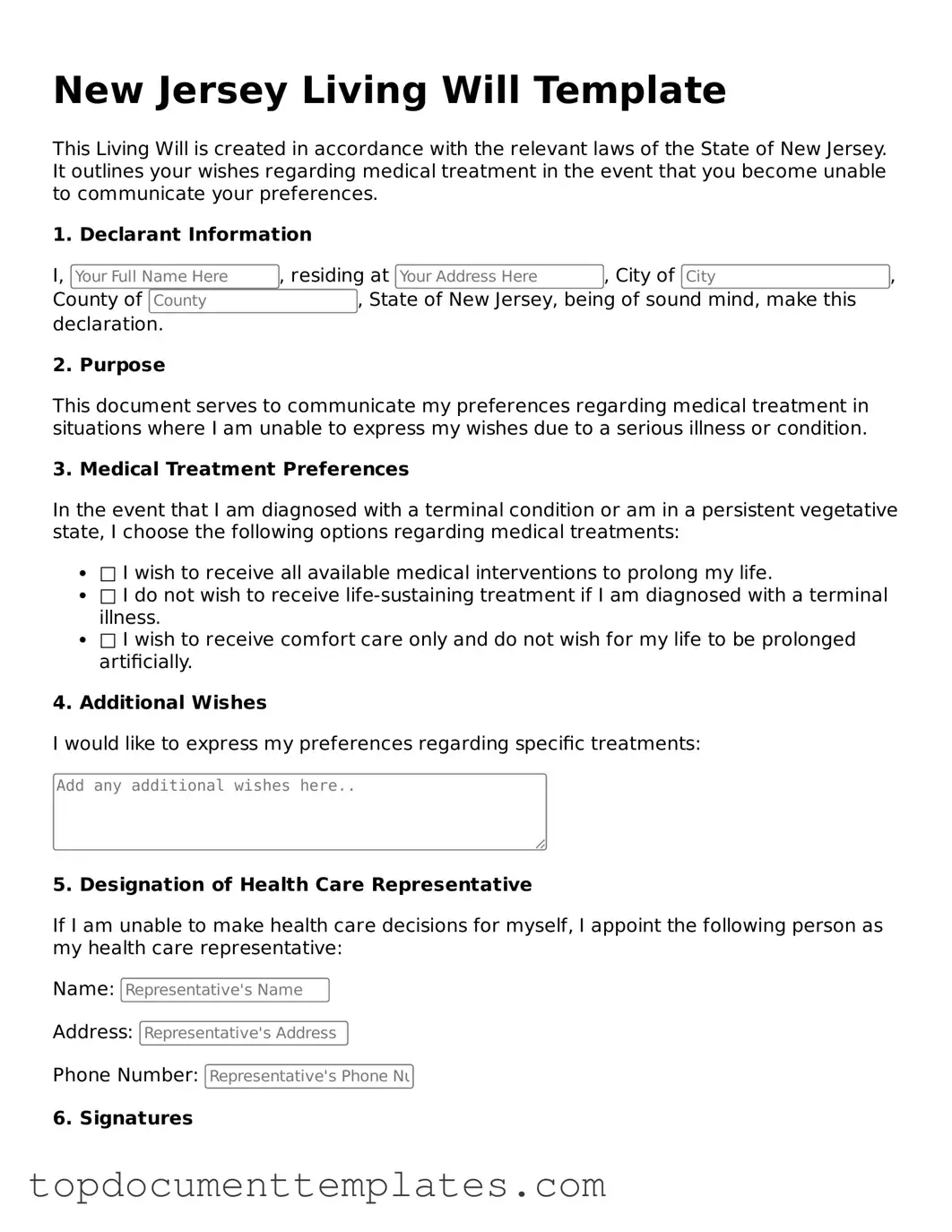Valid Living Will Form for New Jersey State
In New Jersey, the Living Will form serves as a vital document for individuals who wish to express their healthcare preferences in advance. This form allows you to outline your wishes regarding medical treatment in situations where you may be unable to communicate your decisions. It typically covers critical aspects such as the types of medical interventions you would want or refuse, including life-sustaining treatments and palliative care. By completing this form, you empower your loved ones and healthcare providers to make informed decisions that align with your values and desires. Additionally, the Living Will can work in conjunction with a Durable Power of Attorney for Health Care, providing a comprehensive approach to managing your healthcare decisions. Understanding the nuances of this form is essential for ensuring that your voice is heard, even when you cannot speak for yourself.
Similar forms
A Living Will is an important legal document that outlines an individual's wishes regarding medical treatment in situations where they may be unable to communicate their preferences. Several other documents serve similar purposes in guiding healthcare decisions and ensuring that a person's wishes are respected. Here are eight documents that share similarities with a Living Will:
- Advance Healthcare Directive: This document combines a Living Will and a Durable Power of Attorney for Healthcare, allowing individuals to specify their medical treatment preferences and appoint someone to make decisions on their behalf.
- Durable Power of Attorney for Healthcare: This document designates a trusted person to make healthcare decisions for someone if they become incapacitated, similar to the decision-making aspect of a Living Will.
- Do Not Resuscitate (DNR) Order: A DNR order specifically instructs medical personnel not to perform CPR if a person's heart stops or they stop breathing, reflecting a person's wishes about end-of-life care.
- Physician Orders for Life-Sustaining Treatment (POLST): This is a medical order that outlines a patient's preferences for life-sustaining treatments, ensuring that healthcare providers follow their wishes in emergency situations.
- Healthcare Proxy: This document allows individuals to appoint someone to make healthcare decisions on their behalf, similar to the appointment aspect of a Durable Power of Attorney for Healthcare.
- Last Will and Testament: Essential for ensuring that your assets are distributed according to your wishes after your death, a documentonline.org/blank-last-will-and-testament/ provides guidance on appointing guardians and executors, making it a critical part of your estate planning.
- Do Not Intubate (DNI) Order: A DNI order indicates that a person does not want to be intubated or placed on a ventilator, focusing on specific medical interventions like a Living Will.
- Patient Advocate Designation: This document allows individuals to designate a patient advocate who can make healthcare decisions, paralleling the role of a healthcare proxy or durable power of attorney.
- Advance Directive for Mental Health Treatment: This document specifies a person's preferences for mental health treatment and appoints a decision-maker, similar to how a Living Will addresses physical health decisions.
Guidelines on Writing New Jersey Living Will
Filling out the New Jersey Living Will form is an important step in expressing your healthcare preferences. After you complete the form, you will need to ensure it is signed and witnessed according to New Jersey law. This will help ensure your wishes are respected in medical situations where you cannot communicate.
- Begin by downloading the New Jersey Living Will form from a reliable source.
- Read through the entire form carefully to understand each section.
- Fill in your full name, address, and date of birth at the top of the form.
- Clearly state your wishes regarding medical treatment in the designated section. Be specific about the types of treatments you want or do not want.
- Consider discussing your choices with a trusted family member or healthcare provider to ensure clarity.
- Sign and date the form at the bottom. This confirms that you are making these decisions voluntarily.
- Have at least two witnesses sign the form. They should not be related to you or have any financial interest in your estate.
- Make copies of the signed form for your records and share them with your healthcare provider and family members.
File Information
| Fact Name | Description |
|---|---|
| Definition | A New Jersey Living Will is a legal document that outlines a person's wishes regarding medical treatment in the event they become unable to communicate their decisions. |
| Governing Law | The New Jersey Living Will is governed by the New Jersey Statutes, specifically N.J.S.A. 26:2H-53 to 26:2H-90. |
| Eligibility | Any adult who is of sound mind can create a Living Will in New Jersey, ensuring their healthcare preferences are respected. |
| Content Requirements | The document must clearly state the individual's preferences regarding life-sustaining treatments and other medical interventions. |
| Witnesses | To be valid, a Living Will must be signed in the presence of two witnesses who are not beneficiaries or involved in the individual's healthcare. |
| Revocation | A Living Will can be revoked at any time by the individual, either verbally or in writing, as long as they are of sound mind. |
| Healthcare Proxy | While a Living Will outlines treatment preferences, individuals can also designate a healthcare proxy to make decisions on their behalf if they are unable to do so. |
Other Popular Living Will State Forms
Free Living Will Template - This form reflects personal values and beliefs, providing clear guidance for medical personnel.
The Dnd Character Sheet form is essential for players seeking a comprehensive understanding of their characters in the realm of Dungeons and Dragons. It organizes crucial details such as abilities, skills, spells, and weapons, transforming gameplay into a more immersive experience. For those interested in finding a reliable resource to manage their character details efficiently, OnlineLawDocs.com offers the tools needed to elevate your adventure.
Advance Directives Include - A comprehensive Living Will can cover various medical scenarios.
